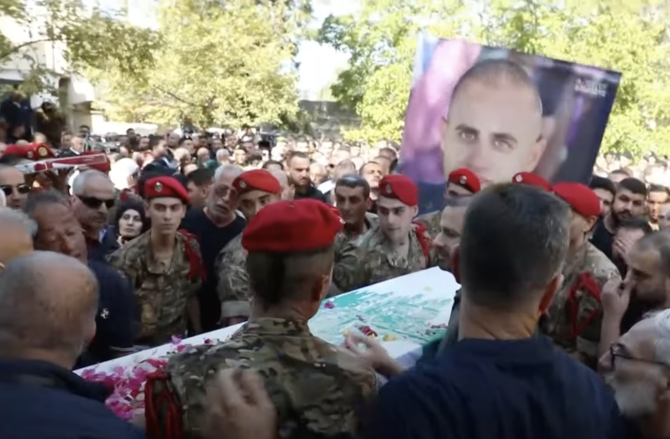BEIRUT: Ongoing Israeli strikes in southern Lebanon have forced the burial of Lebanese Army officer Maj. Mohammed Farhat to take place in an alternative location.
Farhat, 30, was killed on Thursday alongside Cpls. Mohammed Hussein Nazzal and Moussa Youssef Mahna while attempting to evacuate wounded civilians in Yater, a town in the Bint Jbeil district.
Originally from Deir Qanoun Ras Al-Ain in Tyre, Farhat’s family was unable to bury him in his hometown due to the conflict.
Instead, he was laid to rest temporarily in the Maronite-majority town of Rash’in, located 95 km north of Beirut.
Burials in temporary alternative locations have been the norm with many of those killed from villages along the southern border amid clashes between Israeli forces and Hezbollah militants.
The burial, marked by a joint Muslim-Christian ceremony, symbolized national unity and coexistence amid deep political divides and Lebanon’s ongoing crisis.
The ceremony began at the Central Military Hospital in Beirut, where Gen. Joseph Aoun, army commander, saluted Farhat’s coffin.
The procession then moved to Saint Maron Church in Rash’in, where a Muslim cleric prayed over Farhat’s body, underscoring Lebanon’s diverse yet united respect for its fallen soldiers.
Farhat’s death has sparked accusations of targeted violence, as social media activists recalled his confrontation with Israeli forces in March 2023.
At that time, Farhat challenged Israeli officers over an attempt to install barbed wire in disputed territory near Aita Al-Shaab, which earned him widespread admiration in Lebanon.
“Rash’in welcomed my brother with honor, just as they had when he served there for nine years,” said Farhat’s brother, Ali.
“The people of Rash’in insisted on holding the prayer in their town as a tribute to him,” he added.
In a eulogy, a representative of Aoun commemorated Farhat’s bravery, describing him as “a son of Deir Qanoun Ras Al-Ain” and “a courageous officer.”
He added: “Our martyr is an example of courage and giving, a man of difficult missions who stood firm and strong in front of the soldiers of the Israeli enemy in defense of his land, and he was an honorable model of good morals, chivalry, nobility and virtue.”
























